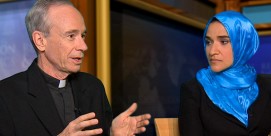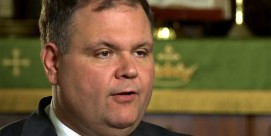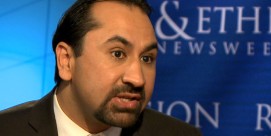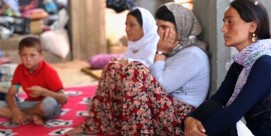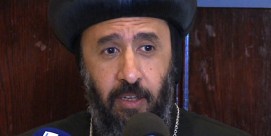In This Episode << SLIDE LEFT TO SEE ADDITIONAL SEGMENTS
Religion and Government News Roundup
BOB ABERNETHY, anchor: There were several stories this week that illustrate the ongoing tensions between religion and government. Our managing editor Kim Lawton joins me to talk about them. Kim, beginning with this report this week from the Chicago Council on Global Affairs about what some have called the “God gap” in American diplomacy.
KIM LAWTON, managing editor: Well, a very influential panel of scholars and religious leaders, former government officials accuse the US of having an uncompromising Western secularism that actually hinders American foreign policy overseas. They say ignorance about religion in places around the world has really hampered US efforts, and they say that there needs to be an entrenched education about the importance of religion.
ABERNETHY: Well, this isn’t the first time people have been talking about that.
LAWTON: People have been talking about this for 20 years, calling for this. Former Secretary of State Madeleine Albright also called for it, but it just never seems to happen. US—the diplomatic community, homeland security and other officials don’t seem to put this into their education and their training, and so they’re hoping that maybe in the Obama administration there will be new opportunities.
ABERNETHY: Another really interesting story, for me anyway, was the reaction of many Muslims to that plane crash last week in Austin, Texas, when a guy who apparently hated taxes flew his airplane into the building that housed the Internal Revenue Service, and it was officially called a crime, and Muslims said wait a minute, that fits the definition of terrorism. Then they charged there was a double standard about what terrorism is, true?
LAWTON: Well, they looked at federal law, how they define terrorism in federal law, which says it’s a premeditated, politically motivated act targeting noncombatants. They say this is what this is. Had it been a Muslim flying that plane they say that the government would have not hesitated to call it terrorism. Government officials say they were looking for links with questionable groups, and there didn’t seem to be any in this situation. So it’s an interesting question.
ABERNETHY: And then there was that interesting story from Indiana, where Goshen College says after years of not permitting the playing of the Star Spangled Banner that, okay, they can now play it. What’s that all about?
LAWTON: Well, Goshen College is a Mennonite college, and Mennonites are part of the Anabaptist tradition of Christianity, which has always been pacifist. It’s also had a very strong separation between church and state, and so for them having a flag in a church or, for some people, for some Mennonites, saying the Pledge of Allegiance elevates love of country and love of God to the same position or maybe makes love of country even greater, reverence for country greater than for God. And so for them the Star Spangled Banner, also with its militaristic language, “bombs bursting in air,” they hadn’t done it, but now they’ve decided they’ll do an instrumental version before sporting events.
ABERNETHY: Kim Lawton, many thanks.

